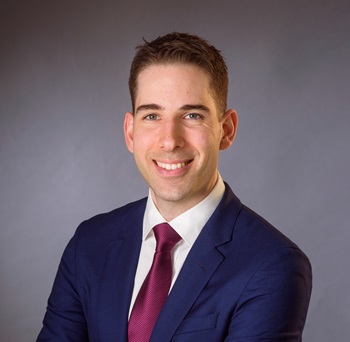2024 | Volume 25 | Issue 5

The preclinical research carried out by Dr Alex Papachristos, RACS 2023 Herbert and Gloria Kees Research Scholarship recipient, holds promise for advanced medullary thyroid cancer patients. His research is exploring a novel therapy that combines the benefits of targeted cytotoxic therapy with immune activation to generate an anti-tumour response.
“We looked at a new treatment for advanced medullary thyroid cancer, which is a type of thyroid cancer that’s more aggressive and often spreads to the liver, lungs and bone, and affects a relatively young cohort of patients,” Dr Papachristos says.
“Historically, there weren’t many treatment options once it spread beyond the thyroid.”
The project looked at an antibody drug conjugate, which means using a specific antibody to target a receptor on tumour cells and deliver a cytotoxic drug, preferentially to tumour cells, which minimises the toxicity to normal cells.
In lab and mouse models, the therapy has shown significant promise. "We’re at the exciting stage where we could progress to a phase I clinical trial," Dr Papachristos says. "While there are challenges ahead, that are an integral part of translating a novel therapy from the lab to the clinical setting, including the regulatory approval process and the unpredictable nature of drug development, the potential impact on patients is significant."
For Dr Papachristos this research is not only about discovering new treatments but understanding the process of innovation in medicine. His involvement in lab research has given him deeper insight into the challenges of translating cutting-edge science into clinical practice. “Gaining experience in basic science research has also connected me in a practical way to this space, developing the relationships that are extremely helpful when trying to access trial therapies for patients.” With a growing arsenal of therapies available for patients with advanced cancer, Dr Papachristos believes that research will play a key role in the future of treatment. “Being involved in research helps me to critically appraise clinical trials and access new therapies for my patients. It’s a way to give them the best chance possible,” he says.
Dr Papachristos’ journey from a science enthusiast to a leading researcher in endocrine surgery has been an exciting one. His career, which began in Melbourne, was shaped by mentors who encouraged him to pursue surgery and research. Now based in Sydney, he continues to advance both his clinical and research careers with a focus on improving outcomes for patients with advanced thyroid cancer.
Dr Papachristos acknowledges the value of the RACS scholarship, which gave him the unique opportunity to embark on PhD research. For surgeons considering research, he recommends finding a supportive team, reflecting that the guidance from his mentors was a crucial factor in the success of the project. There are inevitable challenges that come with lab work. “You’re often faced with unexpected hurdles but overcoming them is part of what makes it so fulfilling.”
Dr Papachristos has found that research offers a balance of flexibility—allowing him time to enjoy life outside the lab. Whether it’s hitting the tennis courts or enjoying Sydney’s stunning beaches and bush walks, the opportunity to recharge has been an important part of his journey.
Find out more about RACS Scholarships and Grants Program